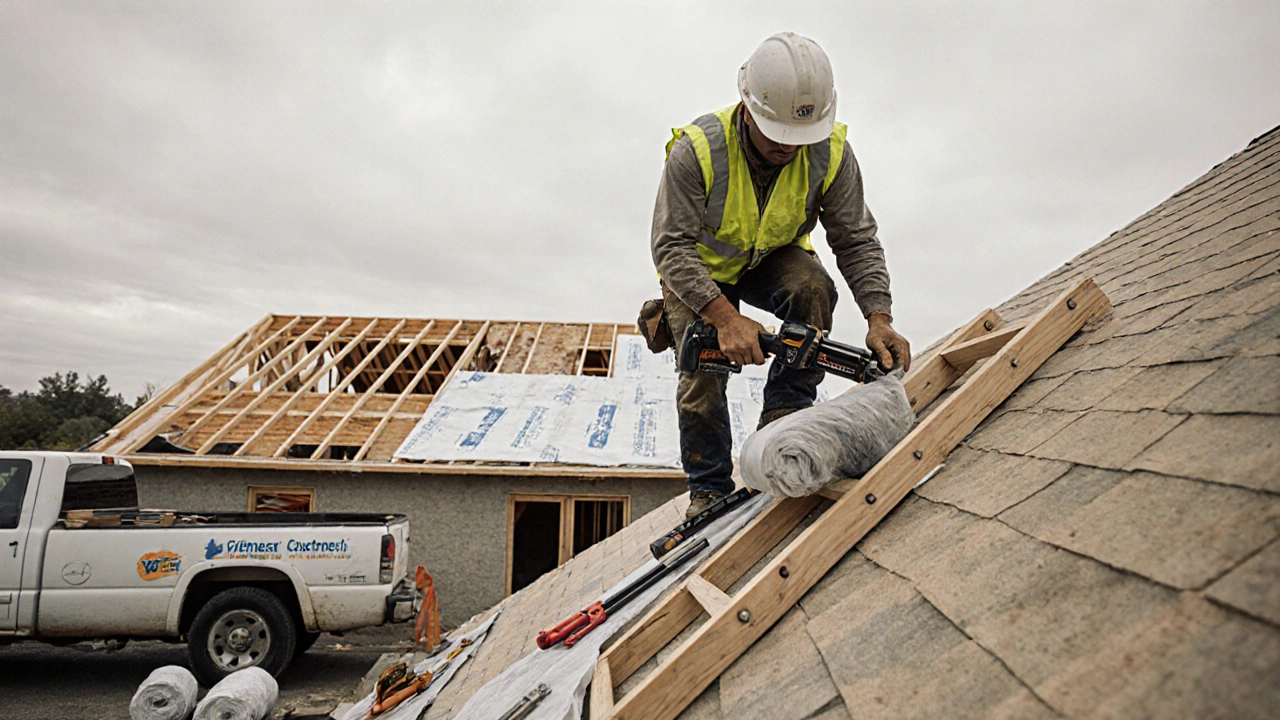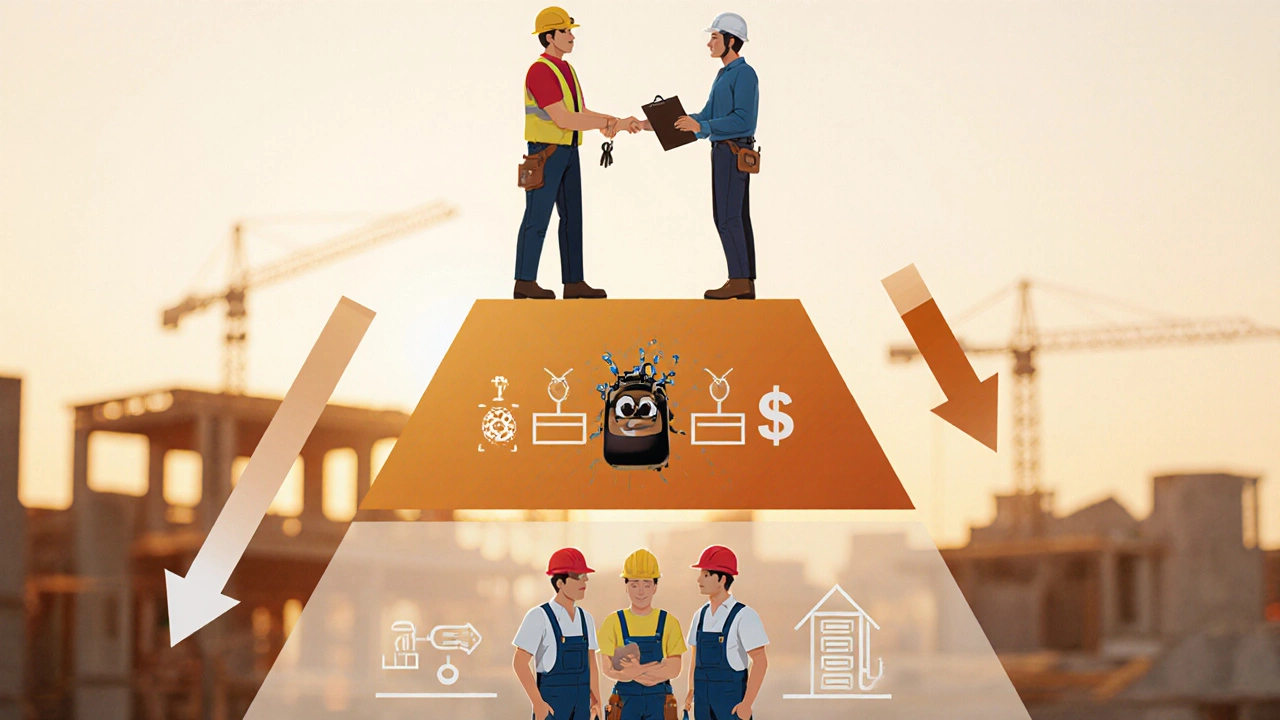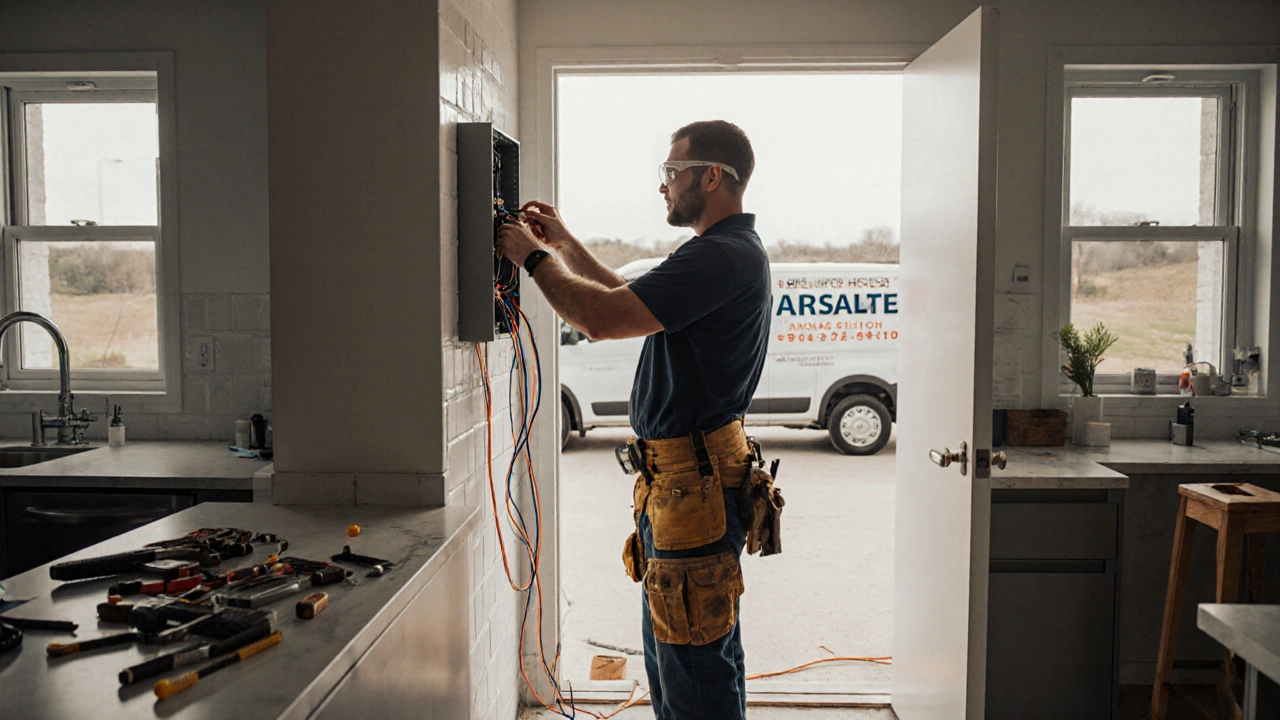Contractor Legitimacy Checker
Verify Your Contractor's Legitimacy
Check if your construction contractor is properly registered with UK trade associations for electrical, plumbing, and gas work.
When you’re planning a home renovation or a commercial build, you hear terms like ‘general contractor,’ ‘subcontractor,’ and sometimes ‘lower tier contractor.’ But what does that last one actually mean? And why should you care? It’s not just industry jargon - understanding contractor tiers can save you money, avoid delays, and even prevent bad workmanship.
Who Is a Lower Tier Contractor?
A lower tier contractor is a specialist tradesperson or small company hired by a subcontractor - not directly by the main contractor or homeowner. They’re often the ones doing the hands-on, physical work that no one else wants to manage. Think electricians wiring a new kitchen, plumbers installing bathroom fixtures, or tilers laying floor tiles. They don’t bid for the whole job. They don’t deal with permits or client meetings. They show up, do their part, and get paid.
In a typical construction chain, the hierarchy looks like this:
- Prime contractor - The main company you sign a contract with. They manage the whole project.
- Subcontractor - Hired by the prime to handle a major scope, like roofing or HVAC.
- Lower tier contractor - Hired by the subcontractor to do a specific task within that scope. Often a solo worker or a two-person team.
For example: A general contractor hires a roofing subcontractor. That subcontractor then hires a lower tier contractor to install the underlayment and flashing. That lower tier contractor might be a single roofer who owns his own ladder and nail gun.
Why Do Lower Tier Contractors Exist?
You might wonder why the system is so layered. Why not just hire the person doing the work directly?
The answer is scalability and specialization. Large projects need dozens of trades working in sync. A general contractor can’t manage 20 different electricians, plumbers, and carpenters on their own. So they outsource major chunks to subcontractors who know how to coordinate those teams. The subcontractors, in turn, rely on lower tier contractors because they don’t have the manpower or equipment to do everything themselves.
This structure keeps costs down. Lower tier contractors operate with low overhead - no office, no sales team, no marketing budget. They drive to sites in their vans, carry their own tools, and get paid per day or per job. That efficiency gets passed down the chain.
How Are Lower Tier Contractors Paid?
They rarely get paid directly by the homeowner or even the main contractor. Payment flows like this:
- Homeowner pays the general contractor.
- General contractor pays the subcontractor.
- Subcontractor pays the lower tier contractor.
This creates a risk. If the subcontractor gets paid but doesn’t pay their lower tier workers, those workers have little legal recourse. They can’t file a lien against your property unless they’re directly contracted with you or the main contractor. In England, the Construction Act 1996 gives payment protection to subcontractors, but it doesn’t extend to lower tier workers unless they’re registered as direct contractors.
That’s why some homeowners prefer to hire through certified firms that guarantee payment to all levels. If you’re hiring a general contractor, ask: “Do you pay your subcontractors and their crews on time?” If they hesitate, it’s a red flag.

Are Lower Tier Contractors Less Skilled?
No - and this is a common myth.
Many lower tier contractors are highly skilled. Some have 20+ years of experience. They might have left bigger firms because they wanted control over their schedule or to avoid office politics. Others are newer tradespeople building their reputation. A lower tier electrician might be the same person who worked on your neighbor’s house five years ago - just working under a different name now.
What changes isn’t skill. It’s responsibility. Lower tier contractors aren’t responsible for design, scheduling, or compliance. They’re responsible for doing their specific task correctly and safely. If they’re good at that, they stay busy.
Look at it this way: You wouldn’t question a chef’s skill just because they work for a restaurant instead of running their own. Same logic applies here.
What Risks Come With Lower Tier Contractors?
The biggest risk isn’t poor work - it’s lack of accountability.
- No insurance coverage - Some lower tier contractors don’t carry public liability insurance. If they damage your property or get injured on site, you could be liable.
- No warranty - If the work fails later, who do you call? The subcontractor? The general contractor? Or the lower tier worker who’s now working on another job across town?
- Unlicensed work - In some cases, lower tier contractors operate without proper certifications, especially in niche trades like gas fitting or electrical work.
Always ask your main contractor for proof that all workers on site - including lower tier ones - are covered by insurance and licensed where required. In the UK, for example, electricians must be registered with NICEIC or ELECSA. Plumbers should be on the Water Regulations Approval Scheme (WRAS).
How to Spot a Reputable Lower Tier Contractor
You won’t find their name on Google Ads. But you can still verify them:
- Ask your general contractor for the names of the subcontractors and their lower tier teams.
- Check if those names appear on trade association websites (e.g., Gas Safe Register, NICEIC, Corgi).
- Ask for references - not from past clients, but from other contractors who’ve hired them.
- Look for consistency. If the same lower tier electrician shows up on three different jobs you’ve seen, they’re likely reliable.
- Watch how they show up. Do they wear safety gear? Do they clean up after themselves? Do they ask questions about your project? These are signs of professionalism.
Many of the best tradespeople in Manchester work this way. They don’t need flashy websites. They get work through word of mouth. If your contractor says, “We use a great guy who’s done all our electrical work for five years,” that’s a good sign.

Should You Avoid Lower Tier Contractors?
No - but you should avoid working with contractors who hide them.
Some shady general contractors use lower tier workers to cut costs and pocket the difference. They’ll quote you £15,000 for a kitchen renovation, then pay £8,000 to a subcontractor, who pays £4,000 to the actual workers. That leaves £3,000 in profit for the contractor - and no guarantee the work will be done right.
Transparency is key. If your contractor refuses to tell you who’s doing the work, walk away. If they say, “It’s none of your business,” that’s not professionalism - that’s a warning sign.
The best projects use lower tier contractors - but they make sure everyone’s vetted, paid fairly, and accountable. It’s not about avoiding them. It’s about knowing they’re part of the system - and making sure the system works for you.
What Happens When Things Go Wrong?
If a lower tier contractor does shoddy work, you can’t sue them directly unless you have a contract with them. But you can hold the general contractor responsible. Under UK law, the main contractor is legally accountable for the quality of all work done on your project - even if they hired someone else to do it.
That’s why you should always:
- Get a written contract with your general contractor.
- Specify that all work must meet British Standards (e.g., BS 7671 for electrical work).
- Include a warranty clause - at least 12 months for workmanship.
- Keep records of all payments and communications.
If something breaks six months later, you go to the company you signed with. They’re the ones who owe you a fix.
Final Thought: It’s Not About the Tier - It’s About the Trust
Lower tier contractors aren’t the problem. The problem is opacity. When you don’t know who’s doing the work, you lose control. When you don’t know who’s accountable, you lose peace of mind.
Good contractors don’t hide their teams. They’re proud of them. They’ll introduce you to the electrician. They’ll tell you why they chose that plumber. They’ll stand behind the work - no matter how many layers down it goes.
So next time you hear the term “lower tier contractor,” don’t assume it’s a bad thing. Ask instead: “Who are they? Are they qualified? And who’s taking responsibility if something goes wrong?” Answer those, and you’re ahead of 90% of homeowners.
Are lower tier contractors legal in the UK?
Yes, they’re completely legal. Many tradespeople in the UK operate as lower tier contractors - especially in plumbing, electrical, and tiling. The key is that they must be qualified and insured for the work they do. If they’re working under a subcontractor, the subcontractor must ensure they meet legal standards. The Construction Act 1996 and Building Regulations cover this chain of responsibility.
Can I hire a lower tier contractor directly?
You can, but it’s risky. If you hire someone directly, you become their employer in the eyes of the law. That means you’re responsible for their insurance, tax, and safety. Most homeowners aren’t set up for that. It’s safer to go through a licensed general contractor who handles all legal and financial obligations for the crew.
Do lower tier contractors charge less than regular contractors?
Yes - but not because they’re worse. They charge less because they have lower overhead. They don’t pay for office space, marketing, or administrative staff. Their rates reflect just the cost of labor and materials. That’s why they’re often used by subcontractors to keep project costs down. But don’t assume low price = low quality.
How do I know if my contractor is using lower tier workers?
Ask directly. Reputable contractors will name their subcontractors and the tradespeople they bring in. If they avoid the question or say, “It’s none of your business,” that’s a red flag. Also, check if the workers on site are wearing branded uniforms - if not, they’re likely independent lower tier workers.
What should I do if a lower tier contractor damages my property?
Contact your main contractor immediately. Legally, they’re responsible for all work done on your project, even if it was done by someone they hired. If they refuse to fix it, you can escalate to their insurance provider or file a complaint with the Construction Industry Scheme (CIS) or a trade association like the Federation of Master Builders.
